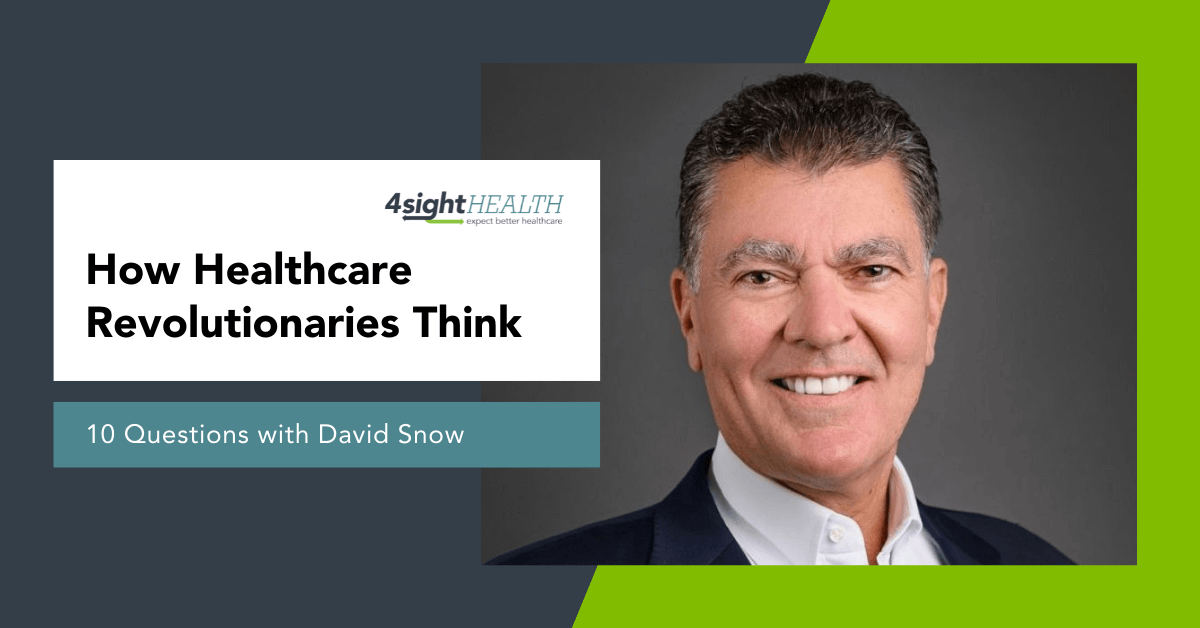February 17, 2022

How Healthcare Revolutionaries Think: 10 Questions with David Snow
Welcome to the latest installment of 4sight Health’s series, How Healthcare Revolutionaries Think. Our interview series profiles healthcare instigators who believe that outcomes matter, customers count and value rules.
If you’re new to healthcare, you may not know or have heard of David Snow. But there is no doubt that you know or have heard of the healthcare companies he’s founded and/or run as president, CEO, COO, chairman, executive vice president or vice president: U.S. Healthcare, AmeriChoice (formerly known as Managed Healthcare Systems), Oxford Health Plans, Empire Blue Cross and Blue Shield, Medco Health Solutions and now Cedar Gate Technologies.
At each stop along his 43-year career in healthcare, Snow identified the job to be done, fixed what was broken and dramatically changed how each company did business, benefiting the business and its customers. Rather than hop off the train and retire, Snow is still onboard, trying to reinvent healthcare as an evangelist for value-based care.
We spoke to Snow about his background, his experiences and what drives him to continue to serve at the frontlines of the customer revolution in healthcare.
1. Dave, let’s start with the first question we ask everyone in this series. What’s your definition of a healthcare revolutionary?
Snow: A healthcare revolutionary is someone who’s never satisfied. It’s someone who is constantly challenging boundaries with a passion to make change. Someone who knows change is needed, doesn’t shy away from it and is uncomfortable with the status quo.
2. Tell me more about challenging boundaries. You’re saying some people who call themselves revolutionaries go up to the line but don’t cross it? But true revolutionaries are willing to cross it?
 Snow: I think a true revolutionary’s job is to constantly push to improve, and there is so much room for improvement in healthcare. A revolutionary understands that healthcare is fraught with all kinds of perverse incentives that drive people to work very hard in order to keep the status quo and avoid change. True revolutionaries feel obligated to cross challenging boundaries.
Snow: I think a true revolutionary’s job is to constantly push to improve, and there is so much room for improvement in healthcare. A revolutionary understands that healthcare is fraught with all kinds of perverse incentives that drive people to work very hard in order to keep the status quo and avoid change. True revolutionaries feel obligated to cross challenging boundaries.
3. Given that description, tell me who your favorite healthcare revolutionary is, past or present?
Snow: I’ve worked with some terrific revolutionaries in my career, let me point to a few. First would be Leonard Abramson who founded U.S. Healthcare shortly after the HMO Act passed in 1973. Leonard was a passionate agent for change — implementing primary-care attribution models, primary-care gatekeeper models, capitated delivery systems. Even back then, Leonard was pushing to change the fee-for-service paradigm and eliminate the perverse incentives — he was evangelical about it.
Second would be Steve Wiggins — different but he also very much a change agent. Steve founded Oxford Health Plans in 1984 and was focused on the patient experience even before “patient experience” was a thing. Steve was also a genius with branding and marketing.
Third would be a physician in my life — other than my father who was an internist — and that’s William Kane, M.D., whom I met at Duke while working on my master’s degree in health administration. He was a physician who was willing to call a spade a spade and attack a problem head on. He was a change agent in ways that most physicians would never dare to be. As is often the case in this industry, I later had the opportunity to engage with Dr. Kane when I ran hospitals and also when I was at U.S. Healthcare.
4. You described Abramson, Wiggins and Dr. Kane as change agents. What in their backgrounds gave them that juice to change things? Did they all have a negative experience with the system in the past?
 Snow: Dr. Kane was a practitioner, so he saw the system from the inside and from a medical education standpoint. Abramson was trained as a pharmacist, so he saw everything through a pharmacy lens. Wiggins and his family come from an insurance background, so he saw how insurance and payment mechanisms work. They each viewed the system from different angles, but they all realized that the system was broken. They all reached same conclusion yet started from different places.
Snow: Dr. Kane was a practitioner, so he saw the system from the inside and from a medical education standpoint. Abramson was trained as a pharmacist, so he saw everything through a pharmacy lens. Wiggins and his family come from an insurance background, so he saw how insurance and payment mechanisms work. They each viewed the system from different angles, but they all realized that the system was broken. They all reached same conclusion yet started from different places.
5. Do you consider yourself a healthcare revolutionary like Abramson, Wiggins and Dr. Kane?
Snow: Yes. I’ve been committed to fixing healthcare from a very young age — since the late seventies and early eighties. On the inside of running hospitals, I saw how the perverse incentives worked for both the hospital administration as well as the medical staff. It irritated the heck out of me. So, after five years I’d had enough, left the provider world, and jumped into the payer side. As I joined the HMO revolution, I recall my father saying that I went to the “dark side.” I’ve been pushing the envelope ever since in every
single job I’ve had.
6. You said that your dad was a doctor and that you come from a family of doctors. Why didn’t you become a doctor? A lot of the people I interview for this series wanted to be doctors but didn’t.
Snow: As I mentioned, my father was an internist with a subspecialty in cardiology. My grandfather was a general practitioner and both were Harvard medical school trained. My mother was a nurse. So, it was fitting that I entered premed as an undergraduate. In my junior year I encountered organic chemistry — the screening tool for med school. In short, I switched my major to economics. It turned out that I was much more intrigued about healthcare at the system level than at the patient level.
7. Your cause du jour is the eradication of what you refer to as perverse payment incentives in healthcare. Like FFS and the adoption of value-based payment systems that reward providers and payers for doing what’s best for patients. On a scale of 1 to 100, how far along are we on adopting value-based payment systems and how far do we still need to go?
Snow: Forty percent of the total healthcare dollar flows through some form of value-based care. But that doesn’t mean we’ve made 40 percent of the journey. This is because there are increasing levels of risk on the value-based care spectrum and the adoption of greater risk is an evolution. If we’re talking about real value-based care — for example, those models with higher risk levels such as two-sided risk, episode-based bundled payments and population-based capitation — we’ve made far less than 40 percent of the journey. Less than 10 percent of the total healthcare dollars are flowing through those higher risk models. Why? Healthcare resists revolution as it prefers to be evolutionary.
8. What’s been the biggest barrier to providers and payers moving to greater risk on the spectrum? And do you see things changing?
 Snow: Access to and integration of data have been the major reasons we haven’t moved faster. Moving to greater risk on the value-based care spectrum requires comprehensive technology solutions. There are a myriad of point solutions today solving only one or two value-based care needs. The problem is that before one knows it, they’ve invested in multiple point solutions, have incompatible data sources that lead to a lack of integrated and actionable insights. The good news is that things are changing. Over the past
Snow: Access to and integration of data have been the major reasons we haven’t moved faster. Moving to greater risk on the value-based care spectrum requires comprehensive technology solutions. There are a myriad of point solutions today solving only one or two value-based care needs. The problem is that before one knows it, they’ve invested in multiple point solutions, have incompatible data sources that lead to a lack of integrated and actionable insights. The good news is that things are changing. Over the past
year at Cedar Gate, we’ve seen a significant shift in demand from point solutions toward broad-based value-based care solutions. This tells me the market is maturing in terms of more complete technology needs.
That said, it’s still very comfortable to stay in fee-for-service as long as you can. It’s petrifying for a big hospital with a lot of beds to say, “Yeah, I’m going all in on value-based care and try to keep everyone well. I’m going to consciously try to not have full occupancy in my hospital. And I’m going to have my ER underutilized.” That slows people down. Providers don’t want to commit to value-based care and take downside risk until they can prove to themselves that they can be successful at it and not fail.
9. You worked at U.S. Healthcare, AmeriChoice, Oxford, Empire. What did you learn about providers from those payer experiences that you think other people don’t know?
Snow: That’s an interesting question. I think what most people don’t know is that many physicians are fundamentally unhappy today about practicing medicine, and it’s not because of things that we usually talk about like EHR systems or administrative tasks. They went into medicine for the most part to take care of patients. They care about patients. But they also want to get paid.
But because of the perverse payment incentives in today’s system, they do things for patients they know in their heart of hearts aren’t necessarily the right things to do. And they don’t do things that they should do for their patients. It’s tearing them apart and making them fundamentally unhappy. That will change once they go all the way across that bridge into value-based care. Then they will get paid for doing the right things for their patients.
10. Last question, Dave. Why not go to the beach?
Snow: I can’t imagine being retired. I’m passionate about this. I don’t do it for the money. The cynic will say, “Yeah, but he makes a lot of money.” If you do something well, the money tends to follow. So, yes, it’s easy for me to say, “I don’t do it for the money,” but the money does seem to follow. You can take that for what it’s worth. I’m very transparent. My motives are very clear.
Our healthcare system can’t continue this way. The alternative isn’t attractive to me, and that’s a single-payer, government-run healthcare system. I’m working hard to make sure healthcare stays in the private sector. The private sector is better for patients than socialized medicine. But we clearly can do a much better job than we’re doing today. I’m going to keep on doing what I’m doing because I care about it. And I think I’ll live a longer life because I care about it.
I like to golf. I like to fish. I love to sail. I love to shoot clays. They’re my rewards for working hard. When I’m not working hard, it cheapens all those things because I don’t appreciate them as much. If you can do them anytime you want, they’re not as special. They’re boring. I’m a complicated person.
Burda’s Final Bit
Healthcare is complicated. And despite the assertion of a former president, a lot of people know that it’s complicated. But the goal of healthcare revolutionaries like Snow isn’t complicated at all. Get paid to do what’s best for the patient. That starts with keeping healthy patients healthy and keeping patients with chronic medical conditions as healthy as possible. Snow is in an enviable position of not worrying about what others think as he challenges the status quo and pushes providers and payers to adopt risk-based payment models that incentivize them to do just that. Keep your foot on the gas, Dave.
David Snow — Chairman & CEO, Cedar Gate Technologies
 David B. Snow Jr. is a nationally recognized healthcare executive with 40 years of experience leading Fortune 50 companies, health plans, hospitals and several innovative healthcare start-ups. He has been featured in numerous articles and is a frequently sought-after public speaker. Mr. Snow was acknowledged as one of America’s Best CEOs by Institutional Investor in 2008, and in 2010, he was named #27 on the Harvard Business Review list of “Best Performing CEOs in the World.” Additionally, Mr. Snow was recognized as the regional E&Y Entrepreneur of the Year in 2006 along with being a national finalist, and was also named a regional finalist as the Cedar Gate CEO in 2021.
David B. Snow Jr. is a nationally recognized healthcare executive with 40 years of experience leading Fortune 50 companies, health plans, hospitals and several innovative healthcare start-ups. He has been featured in numerous articles and is a frequently sought-after public speaker. Mr. Snow was acknowledged as one of America’s Best CEOs by Institutional Investor in 2008, and in 2010, he was named #27 on the Harvard Business Review list of “Best Performing CEOs in the World.” Additionally, Mr. Snow was recognized as the regional E&Y Entrepreneur of the Year in 2006 along with being a national finalist, and was also named a regional finalist as the Cedar Gate CEO in 2021.
Mr. Snow is currently the Founder, Chairman and CEO of Cedar Gate Technologies, a provider of technology-powered, end-to-end solutions designed to enable customer success in value-based care, encompassing enterprise data management, analytics, population health, bundles and capitation technologies, along with other managed and consulting services.
Prior to Cedar Gate Technologies, Mr. Snow was the Chairman & CEO of Medco Health Solutions, a Fortune 34 company. Mr. Snow took Medco public in 2003 and grew it from $30 billion to $72 billion in revenue over a nine-year period. Before Medco, Mr. Snow held positions including President and COO of Empire Blue Cross Blue Shield, EVP of Oxford Health Plans and President of HMO New Jersey for US Healthcare. Earlier in his career, Mr. Snow founded his first company, Managed Healthcare Systems (later renamed AmeriChoice), which was later sold to United Healthcare.
He is Chairman of the Board for Teladoc, Inc., which is publicly traded on the NYSE. Mr. Snow is also on the Board of Premise Health and he is Chairman of the Board of Visitors for the Fuqua School of Business at Duke University.
Mr. Snow holds a Bachelors Degree from Bates College, and a Masters Degree in Healthcare Administration from the Fuqua School of Business, Duke University. He and his family reside in Darien, Connecticut.
Read More Healthcare Revolutionary Interviews
- October 2021: Glen Tullman
- September 2021: David Greenberg and Dave Jacobs
- August 2021: Jeff Jones
- July 2021: Scott Powder
- June 2021: Robert Pearl, M.D.
- May 2021: Kurt Waltenbaugh
- April 2021: Jon Pearce
- March 2021: Thompson Aderinkomi
- February 2021: Gaurov Dayal, M.D.





